
Destry Rides Again is a 1939 American Western comedy film directed by George Marshall and starring Marlene Dietrich and James Stewart. The supporting cast includes Mischa Auer, Charles Winninger, Brian Donlevy, Allen Jenkins, Irene Hervey, Billy Gilbert, Bill Cody Jr., Lillian Yarbo, and Una Merkel.
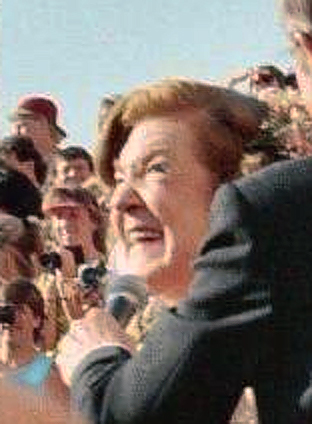
Anne Ramsey-Mobley was an American actress. She was best known for her film roles as Mama Fratelli in The Goonies (1985) and as Mrs. Lift in Throw Momma from the Train (1987), the latter of which earned her nominations for an Academy Award and a Golden Globe Award.

Louis Francis Cristillo, better known as Lou Costello, was an American comedian, actor and producer. He was best known for his double act with Bud Abbott and their routine "Who's on First?".

Zandvoort is a municipality in the province of North Holland, Netherlands. It is one of the major beach resorts of the Netherlands; it has a long sandy beach. It is bordered by coastal dunes of Zuid-Kennemerland National Park and the Amsterdam water supply dunes. It hosts the country's most prominent motor racing circuit, Circuit Zandvoort.

Douglass Rupert Dumbrille was a Canadian actor who appeared regularly in films from the early 1930s.
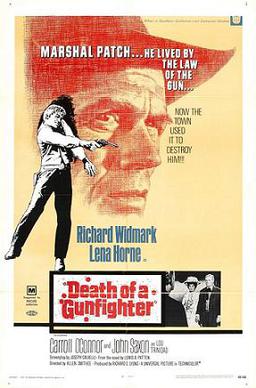
Death of a Gunfighter is a 1969 American Western film directed by Robert Totten and Don Siegel. It stars Richard Widmark and Lena Horne. and features an original score by Oliver Nelson. The theme of the film is the "passing" of the West, the clash between a traditional character and the politics and demands of modern society. The film direction is credited to Alan Smithee, a pseudonym used by directors who repudiate their involvement in a film.
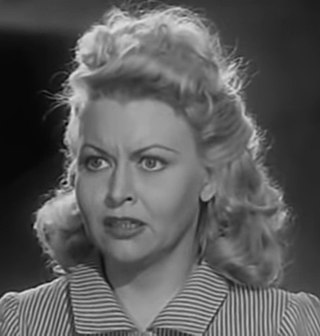
Barbara Pepper was an American stage, television, radio, and film actress. She is best known as the first Doris Ziffel on the sitcom Green Acres.

The Punch and Judy Man is a 1963 black and white British comedy film made by Elstree Studios directed by Jeremy Summers from a script by Philip Oakes and Tony Hancock for the Associated British Picture Corporation. It was Hancock's second and last starring role in a film, following The Rebel (1961).

My Little Chickadee is a 1940 American comedy-western film starring Mae West and W. C. Fields, featuring Joseph Calleia, Ruth Donnelly, Margaret Hamilton, Donald Meek, Willard Robertson, Dick Foran, William B. Davidson, and Addison Richards, and released by Universal Pictures. It was directed by Edward F. Cline and the music was written by Ben Oakland and Frank Skinner.

Paradise Falls is a weekly soap opera television series which aired nationally on the Showcase channel in Canada, starting in 2001. It was filmed in the summer cottage community of Muskoka, Ontario.
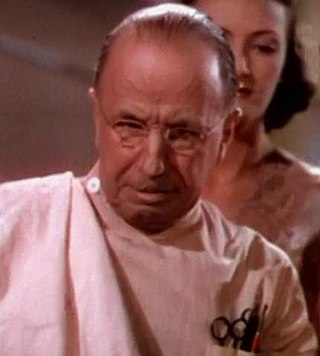
Arthur Hoyt was an American film character actor who appeared in more than 275 films in his 34-year film career, about a third of them silent films.
Frank Marion Thomas was an American character actor of stage, screen and television. He and his wife, actress Mona Bruns, both lived to 100 years old. He died the day before her 90th birthday; she died 11 years later. Their son was Frankie Thomas.

The Girl of the Golden West is a 1938 American musical Western film adapted from the 1905 play of the same name by David Belasco, better known for providing the plot of the opera La fanciulla del West by Giacomo Puccini. A frontier woman falls in love with an outlaw.

M'Liss is a 1918 American silent comedy drama film directed by Marshall Neilan, written by Frances Marion and based on a Bret Harte story. The film was made previously in 1915 and was remade again in 1922 as The Girl Who Ran Wild, starring Gladys Walton. Another same-titled remake was released in 1936, starring Anne Shirley.
The Uninvited, also known as Victim of the Haunt, The Haunting of Patricia Johnson, and The House at the End of the Street, is a 1996 made-for-TV film directed by Larry Shaw and starring Sharon Lawrence and Beau Bridges. Inspired by true events, the film was written by Karen Clark.
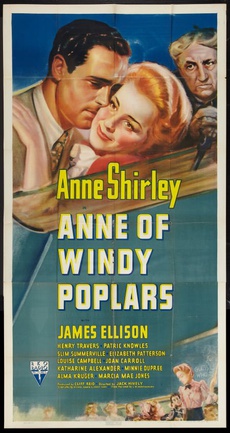
Anne of Windy Poplars is a 1940 film based on the novel of the same name by Lucy Maud Montgomery. A sequel to the 1934 film Anne of Green Gables, it features Anne Shirley returning from the first film in the title role.

James Bush was an American actor from the 1930s until the early 1950s. He appeared in more than 100 television shows and films, more than 80 of them being feature films.
George Nicholls Jr., also known as George Nichols Jr., was an American director and editor during the 1930s. Born to show business parents, and son of prolific actor and director George Nichols, he entered the film industry at the tail end of the silent film era, working as an editor for the Paramount Famous Lasky Corporation. After moving to RKO Pictures in 1933, Nicholls shortly began directing films by the end of the year. His career was cut short when he died in a car accident while driving to the location of his final film.

Showdown at Boot Hill is a 1958 American Western film directed by Gene Fowler Jr., written by Louis Vittes, and starring Charles Bronson, Robert Hutton, John Carradine, Carole Mathews, Fintan Meyler and Paul Maxey. The film was released on May 1, 1958, by 20th Century Fox.

Rails Into Laramie is a 1954 American Western film directed by Jesse Hibbs and written by D.D. Beauchamp and Joseph Hoffman. The film stars John Payne, Mari Blanchard, Dan Duryea, Joyce Mackenzie, Barton MacLane and Ralph Dumke. The film was released on April 14, 1954, by Universal-International Pictures.

















